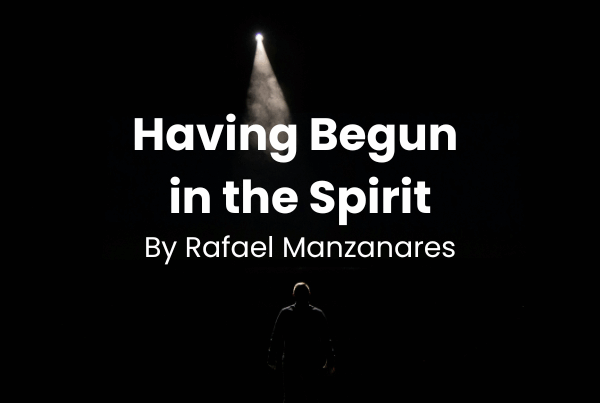
“The angel of the LORD appeared to him in a blazing fire from the midst of a bush; and he looked, and behold, the bush was burning with fire, yet the bush was not consumed. So Moses said, “I must turn aside now and see this marvelous sight, why the bush is not burned up.” When the LORD saw that he turned aside to look, God called to him from the midst of the bush and said, “Moses, Moses!” And he said, “Here I am.””
Exodus 3:2-4 (emphasis added)
When you look at the countless examples of people that God has used throughout history, there seems to be a common trait with them all. They all responded. Some responded wholeheartedly and some reluctantly, but just about all made a conscious decision that God deserves a response. Apathy has no place in the kingdom of Heaven. One of man’s greatest temptations throughout the ages has been apathy—a lulling to sleep spiritually, an avoidance of responding appropriately.
Moses’ Response to God Revealing Himself
I recently read the section in Exodus on the burning bush, and something stood out to me. I was convicted by Moses’ response. I have the tendency to ask God to reveal Himself or give some sort of revelation of Himself. I tend to like signs and proof. But how can I ask for more if I haven’t responded to what He’s already revealed?
In the account of Moses and the burning bush, we have a great example of how we should respond to what is right in front of us. We see in this exchange with Moses that God didn’t speak until after Moses responded to His presence in the burning bush. One could argue that Moses’ encounter with the burning bush warrants his response because of how miraculous the incident was. But do we acknowledge His overwhelming and holy presence in our midst daily? Is creation any less miraculous than a burning bush? Have we ever lifted our eyes to the heavens? The vast universe, the sun, moon, and stars, the mountains and oceans, the sunrise and sunset; are these any less miraculous? Have we ever contemplated what is right in front of us? Have we responded appropriately to what He’s already revealed?
Lifting Our Eyes to the Heavens
In Isaiah 40:26, we are instructed to “Lift up your eyes on high and see who has created these things…” Oswald Chambers says regarding Isaiah’s command to lift our eyes to the heavens, “The people of God in Isaiah’s time had blinded their minds’ ability to see God by looking on the face of idols. But Isaiah made them look up at the heavens; that is, he made them begin to use their power to think and to visualize correctly. If we’re children of God, we have a tremendous treasure in nature and will realize that it’s holy and sacred.
We’ll see God reaching out to us in every wind that blows, every sunrise and sunset, every cloud in the sky, every flower that blooms, and every leaf that fades … The real test of spiritual focus is being able to bring your mind and thoughts under control. Is your mind focused on the face of an idol? Is the idol yourself? Is it your work? Is it your idea of what a servant should be, or maybe your experience of salvation and sanctification? If so, then your ability to see God is blinded … If your power to see has been blinded, don’t look back on your own experiences, but look to God.”
Seeing God’s Fingerprints in His Creation
Chambers calls this ability to see God’s fingerprints in His creation “sanctifying our imagination.” If we don’t want our vision to dwindle, if we want to avoid spiritual apathy, it will require sanctifying our imagination. Chambers doesn’t mean we pretend to see God; he means we respond to the countless number of ways God reveals Himself daily. Creation itself is overflowing with miraculous design, with holy testimony.
Astrophysicist and author Ethan Siegel said this: “When you put it all together, it means the most astounding fact about the Universe is this: that it exists in such a way that it can be understood at all.” What Seigel’s statement touches on is an astonishing and miraculous fact that often goes unnoticed. It’s the fact that since creation exists in an understandable way, and since humans exist with the capability to understand it, it is logical to conclude that it was created to be understood. Ethan Siegel, as far as I know, isn’t a Christian. But he brings up an excellent point.
Creation testifies to the fact that God has designed it in such a way so as to lead us to Himself. His creation declares Him to us. Isaiah instructs us to look at God’s creation because there is a revelation there for us, a revelation that helps guard against spiritual apathy. You could say creation itself is our burning bush. I’m not saying that we should worship nature or creation. But His creation does provide a timeless testimony of His love and existence for those who are willing to look. You can accept this testimony or reject it, but it would be a tragedy to ignore it. At the very least, it deserves a response.
Elizabeth Barrett Browning, a poet in the 1800s, put it this way: “Earth is crammed with Heaven, and every common bush afire with God; and only he who sees takes off his shoes. The rest sit round it and pluck blackberries.”
If we can lift our eyes to the Heavens as Isaiah declares, we’ll see a glimpse of just how miraculously and emphatically God has revealed Himself. And such a revelation, like the burning bush, deserves a response. I pray that we’ll be those who respond.







